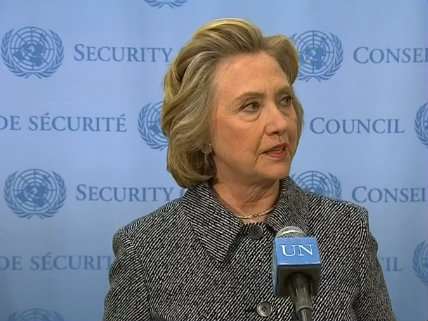Hillary Clinton Says She Used One Phone and Private Email While Secretary of State for 'Convenience'
Yet just a few weeks ago, she said she used two different phones.

In a press conference at the United Nations today, former Secretary of State Hillary Clinton responded for the first time to questions about her decision to conduct all of her email business from a single, privately run account during her tenure at State. The heated session, which lasted roughly twenty minutes before coming to an abrupt end, left more questions than answers.
First, Clinton claimed that her decision to rely on a single email account was so that she could carry a single phone. This, she said repeatedly, was for "convenience." Many of her emails, she noted, were sent to government employees at government addresses and recorded that way. At the time the decision was made, it "didn't seem like an issue."
At best this excuse suggests that Clinton is willing to prioritize personal convenience over transparency and accountability, which is probably not a great look for someone who is expected to announce a presidential campaign in the near future.
It's also more than a little bit difficult to completely believe—not only because it's common for government employees to carry multiple devices in order to manage multiple accounts, but also because, in a video taken just a few weeks ago, Clinton said she has two different phones: an iPhone and a Blackberry.
(Video via the GOP research shop America Rising.)
This doesn't prove that Clinton used two phones while secretary of state, but it does suggest that, at least at this point, she finds it convenient enough to keep two of them around.
Clinton also said today that she had instructed aides to turn over all work-related emails from the account to the State Department, and for those emails to be made public after State Department review. She said she insisted that the search parameters be broad, that the collection effort "err on the side of providing anything that could possibly be viewed as work related."
But she also said that about half of the roughly 60,000 emails on the server were deemed personal, and therefore not handed over. (She seemed at one point to suggest that the emails deemed personal may have been destroyed, although it's not entirely clear whether that's what she meant.)
How could the public trust that all relevant emails had been turned over? Would she allow independent access to her private server?
No, she said, she would not make the server itself public, in part because the "server contains personal communications from my husband and me."
The argument here seems to be that any look at Hillary Clinton's emails on the server would also expose Bill Clinton's emails. There are two problems with this excuse. One is that it requires the public to simply trust that Clinton and those going through the emails on her behalf turned over every single relevant email. Without independent verification, there's no way to check whether or not this is true.
The other reason to be skeptical is that Bill Clinton doesn't use email. According to The Wall Street Journal, the former president has sent only two emails in his life, both while president—before Hillary Clinton's current private email system was set up. So what personal communications would a look at her email server expose?
Clinton didn't say. Instead, she argued broadly that she had met all of her obligations to preserve communications, and that most of her emails were preserved automatically because they were sent to other government employees on their government email accounts.
So what about Scott Gration, the former Air Force General and ambassador to Kenya who was pushed out—he says he was "fired"—in part because he wasn't using his official government email account?
This was the subject of the final question asked during the session, and she responded by dismissing its premise, then walking out. "I think you should go online and read the entire IG report, that is not an accurate representation of what happened," she said as an aide whisked her away from the press.
Fair enough. Here's what the Inspector General's report on the matter says:
The Ambassador's greatest weakness is his reluctance to accept clear-cut U.S. Government decisions. He made clear his disagreement with Washington policy decisions and directives concerning the safe-havening in Nairobi of families of Department employees who volunteered to serve in extreme hardship posts; the creation of a freestanding Somalia Unit; and the nonuse of commercial email for official government business, including Sensitive But Unclassified information. [emphasis added]
Clinton did express a tinge of regret about the choice to rely on a single phone and a single email account. "Looking back, it would have been better for me to use two separate phones," she said. Judging by this mess of a press conference, which will likely satisfy only the most ardent Clinton defenders, it probably would have been more convenient.


Show Comments (237)